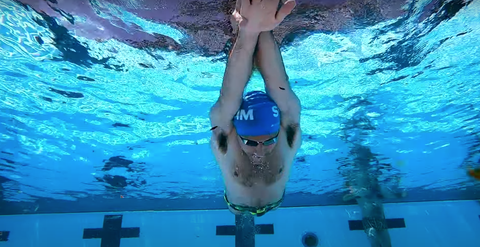
Swimmers often live in the pool, making it a moderate miracle they don’t develop gills in the process. But even the most diligent pro swimmers often take a day each week to rest and recover from their workouts.
But what happens if you swim just over two miles each and every day for a month? Well, this guy found out.
Businessman and swimmer Fares Ksebati recently challenged himself to swim more than 100,000 meters (or just over 62 miles) in 30 days to raise money for the Movember foundation. In the end, he swam over 110,000 meters (or about 68.5 miles) in the month of November, raising over $1,000 in the process.
In a YouTube video posted my swimming fitness app MySwimPro (of which Ksebati is the founder and CEO), Ksebati says he failed the same challenge a year prior, falling short of his target. To meet his goal this time around, Ksebati had to swim at least 3,350 meters—or about 2.1 miles—per day.
Ksebati said he would sometimes swim the required amount in one stretch. Other times, he swam twice in a day, hoping to reduce the stress on his body and for some much-needed variety.
“Swimming every single day was a new experience for me. I normally only swim three or four times per week…” he says in the video. “Even in college, we would only swim six days per week, and we’d have a full day off to completely recover.”

In that way, Ksebati cheekily calls the challenge “uncharted waters,” saying he didn’t know how he would feel after 30 days of swimming. Turns out, he didn’t feel half bad, thanks to the low-impact nature of swimming.
“During these 30 days, my vital lung capacity improved, my average resting heart rate dropped, and I also swam faster,” Ksebati says. “My average swimming pace dropped by about 10 percent by the end of the month. I was able to swim faster with less energy just by … developing a more robust aerobic capacity. “
Above all, Ksebati says he gained “an incredible feel of the water,” deepening his connection with the sport.
“The more time you spend in the water, the more refined this feel comes,” he says. “As soon as you stop swimming, you start to lose this feel of the water. Because I swam every day—and I averaged less than 24 hours between every swim session—I felt an incredible connection with the water.”
Source: Read Full Article